- Home
- Sherwood Smith
A Sword Named Truth Page 2
A Sword Named Truth Read online
Page 2
She reached the barns, where girls were busy bedding down horses for the night, and asked after Fenis until she was pointed in the proper direction.
She spotted a familiar dark, curly head. Fenis looked exactly like her brothers from the back, but when she turned, Hibern recognized her, though she was dressed much like the younger academy boys in her loose tunic-shirt and long riding trousers.
Fenis stared, brow furrowed. Hibern paused, waiting. She could imagine Fenis thinking: tall, black hair, black eyes, riding clothes, but what’s that sky blue robe over them? Mage blue, hadn’t she heard something about her old playmate doing magic studies?
Fenis exclaimed, “Hibern! I thought you were . . .”
“Disinherited and driven from home?” Hibern asked in a hard enough voice to hide how it still hurt, all these months later. “Yes, I was. I’m now a mage student.”
Fenis made a quick slapping motion in the air, as if to strike the words away. “Magic,” she said, and grimaced. “Almost as nasty a subject as the regent.”
Hibern knew that any magic but the everyday spells that everyone used without thinking, such as the Waste Spell, or those concerning bridges, roads, and water purity, was a matter of distrust to her fellow Marlovens. And she was not about to explain the difference between the dark magic that Marloven mages had been using for several centuries, and light, which was now her study. “Senrid? They said in the castle that he’s here. What’s going on?”
Fenis scowled. “They won’t let us girls anywhere near.” She gave Hibern a grim smile. “But if you really do know magic, maybe you could make us invisible so we can climb to that rooftop there? We could see everything.” She pointed toward a glow from many torches.
Hibern didn’t bother saying that invisibility was impossible. What she needed was an illusion that would deflect attention from them, and that was easily done—and as easily penetrated if anyone were actually looking for them, illusions being mere tricks of the willing eye.
Illusions were the first thing mage students learned. A word, a gesture, and Hibern said, “Lead on.”
Fenis led the way to a fence. Hibern kirtled up her mage robe, and followed Fenis onto the fence, then on a hard, fast scramble onto the slanted roof until they reached the ridgepole.
Hibern clung grimly, hating heights, as she glanced below into a walled square around the perimeter of which a huge crowd of younger boys crouched. Torches had not only been jammed into the sconces at the edges of roofs, but into cracks along the walls. Boy guards stood guard on the wall, but their attention was bent solely on the tall senior and the shorter, blond figure in the gold-lit square. Both boys were shockingly blood-splattered, as was the ground. In that ruddy light, the blood looked black.
“Why doesn’t Senrid stop it?” Hibern whispered.
“Don’t you see? They’re in shirtsleeves. It means the rules are laid aside. Even for a harvaldar.” She used the formal Marloven word for ‘king.’
Hibern wanted to scream out her sudden upsurge of fury. Senrid, the smartest person her age she knew, was doing the stupidest thing possible. He risked his life down there in a useless fistfight when he could command the entire army to stop these obnoxious academy boys. He was a powerful enough mage to cast spells to hide the sun from the entire kingdom—and there he was, letting some brute beat the snot out of him.
She clenched her fists, wanting to drop a stone spell over them both.
In the court, Senrid tried to keep his focus on the blood-smeared face before him, though distracted by the drip from his own nose—did the drips coincide with the throbs?—and the horrible flutter in his muscles that he knew meant he was tiring . . .
Senrid saw the intake of breath, the tightening of muscles a heartbeat before Ndarga swung.
He was fast. Senrid had begun his block, but Ndarga’s fist caught the side of his head. He shut his eyes against the pain-flash and used the recoil to torque his block, step, and kick low.
Ndarga shifted. Not quite fast enough. Senrid’s boot heel clipped his knee, and he staggered.
That was the last blow Senrid landed for the next thousand years. He had one advantage, but it was untrustworthy at best: he could hear others’ thoughts, if he concentrated. Dena Yeresbeth was a new idea, discovered when he and Liere had been on the run the year before. Ndarga’s intent reached Senrid’s mind less than a heartbeat before his body acted, giving Senrid very little time to react as he tried to avoid the worst blows.
His strategy, which had seemed like such a good idea before he started, was to use his being smaller and lighter to stay ahead of Ndarga until the older boy wore out. Senrid understood within the first half dozen desperate exchanges how wrong he was to base his strategy on his limited experience of real contact fighting.
Commander Keriam, who had trained Senrid, was in excellent condition—for a man in his fifties. The time it took to cause a man of fifty years to get out of breath was far shorter than that required to tire a nineteen-year-old who had been training hard for the past nine years.
Further—Senrid spared a moment to take in the watchers—his strategy looked like cowardice from the outside.
Think. Keriam had trained them all. Senrid saw familiar patterns in Ndarga’s moves. Another thousand years was going to pass, and it was only going to get worse unless he did something . . .
What am I doing wrong? He was using the patterns to evade—
Oh. So think against the pattern.
He reversed. Jumped in instead of to the side, dealt Ndarga a stinging slap over the ear, then followed with a fist to the gut. It was like hitting wood. He danced back, wringing his throbbing fingers. Ndarga took a harsh breath. So the blow did have an effect.
It wasn’t much of one, but it was enough to anger Ndarga, who returned with a wicked flurry of feints and strikes.
That was another thing that Senrid’s training with Keriam had not taught him. They’d always halted when they began to puff, as Keriam discussed Senrid’s errors. There was no halt for discussion now. Senrid crowed for breath, the edge of his vision smeary on one side, glittering on the other. Focus! Break the pattern.
Another half a dozen blows and he fell to his knees once, causing a shout to go up. Some laughter. He rolled, used the anger sparked by that derisive laughter to launch himself straight into Ndarga for a head-butt to the gut.
Ndarga smacked him away. Tears stung Senrid’s eyes, his nose throbbing, but he’d heard that grunt. Patterns! Ndarga was taller, and used to hitting high, from the gut up. Senrid feinted high, then came in with kicks. One connected solidly with Ndarga’s forward knee, causing him to nearly topple as he brought a fist up under Senrid’s jaw.
Senrid threw himself to the side, deflecting most of the force of the blow. Still felt like his neck had broken. Sick, dizzy, desperately thirsty, he knew he was going to lose. The question was how badly.
Listen! He could make one more try. Go out fighting . . .
Senrid sensed that Ndarga’s thoughts were nearly as inchoate as his own, but by now Senrid had the patterns. He sidestepped—barely—two blows whizzing close to his ears. Could’ve crushed bricks. Then Ndarga followed through with what was intended to be the final series: a lunge, uppercut, two side blows.
Senrid put all he had into avoiding the uppercut, but instead of retreating, he whirled into Ndarga, fists together, straight into the point below the breastbone. Being shorter, he had the advantage of thrusting upward. Thud. Ndarga’s eyes widened, and his breath whistled.
Senrid was aware of a roar. Inside his head or out?
Then Ndarga’s hands hit either side of his head and Senrid’s vision flashed into scattered lights. He found himself on the ground, arms and legs twitching, the side of his face gritting in dirt. Dust got in his mouth. He groaned, trying to spit it out. Then fingers gripped his shirt collar and yanked him up.
The roar in his
ears resolved into voices, then into words as his bleary vision took in Ndarga looming over him. Ndarga was on one knee, swaying. Senrid squinted up at him, waiting for the last blow.
But it didn’t come. “Shit,” Ndarga muttered, and flung him away.
Senrid landed with a splat, nose first. Pain shot through him. He had just enough strength to flop over and gaze up at the sky, which revolved gently. One by one round brownish blobs appeared. Then a familiar voice . . . “Satisfied?”
Keriam stepped into the court, looking neither right nor left. The boys, out of long habit of obedience, stilled.
“Ndarga. Satisfied?”
Jarend Ndarga was mopping his bleeding nose and looking around as if he’d find his wits among the blood splatters on the stones. “Yes,” he said.
Whispers from the walls, but no one moved. The rules held, barely. The boys stilled, a breath away from chaos as Keriam bent over Senrid, and repeated, “Satisfied?” Because that was the rule in these personal scraps.
Senrid struggled to speak. “Yes.”
It came out sounding like “Wheh,” but Keriam straightened up, and turned his toughest glare around the waiting faces. Then in a field command voice, “Fight’s over, both satisfied. Anyone out of place by the time the watch change rings—and I’m sending a runner to the bell right now—wins a breeze from my own hand.” He pulled a polished length of ash from his belt and whacked it against his leg.
The rumble and dust of many feet running followed. Clear chain of command, Senrid thought. Keriam ruled the academy. Could he take the kingdom? Yes. No. They’d kill him. They might kill me.
He couldn’t find a reason to care, as hands took hold of various portions of his body. Now, he knew from experience, was going to be the worst of it. He couldn’t speak, but he could sort sensations and interpret their meanings.
Senrid knew who he was. The thing he’d figured out by the time he was eight was that he wasn’t the same person to everyone. To Uncle Tdanerend, he was the stupid little boy whose inconvenient birth kept Tdanerend from kingship. As long as Senrid was small, and acted stupid, nothing fatal happened to him.
Now he was going to find out if he was Senrid-the-dead-king, Senrid-the-former-king, or . . .
He was carried, not hauled. He was put on something soft, not flung down into stone and darkness. Without having to make the effort to listen for unspoken thoughts, he knew from the way he was handled that he was still—at this moment—Senrid-Harvaldar.
Chapter Two
KERIAM followed the runners carrying Senrid, and watched as they laid him gently on his bed.
“Fetch the healer,” Keriam said to one, and “Strip him, and clean up the blood,” he said to two others.
Keriam had scarcely breathed during the endless agony of that fight. He could have told Senrid all the reasons why it was a bad idea, but Senrid had launched straight out there, driven by a desperation that Keriam understood.
The former regent had so distorted his brother’s attempt at re-instituting rule of law that Marloven Hess had been thrown back to the worst days of the old Olavair kings, under most of whom rule by whim had been the norm. Jarls had been petty kings in those days, unanswerable to anyone. The regent, in buying favorites, had been eroding all his brother’s hard-won attempts at establishing a justice system that extended to everyone. So here was Senrid, trying to prove that he was fit to rule, young as he was, in the only way that Marlovens would understand: by the oldest tradition.
It had taken all Keriam’s control not to interfere.
The runners were quick and efficient, Senrid mercifully unconscious. When they were done, Keriam carefully checked Senrid over.
Long experience with battered bodies convinced him that his first assessment was correct: Ndarga had retained enough self-control not to do permanent damage, though he had used all his years of hard training to make this thrashing as painful as possible. As Senrid stirred, muttering something through puffing lips, the garrison healer arrived, breathless from running.
* * *
—
Downstairs, Hibern arrived from the seniors’ private court in the academy. She sent a runner up to Senrid, hoping he was in better shape than he’d looked, then prowled the lower hall, trying to figure out what to do if she was denied. She was on her fifteenth lap (she’d first said she’d give herself ten, then twenty) when the runner reappeared and said, “King will see you.”
She ran upstairs to the royal residence on the third floor. Instead of the plain stone walls of the lower floor, here were fine frescoes in shades of gray, depicting running horses and swooping raptors.
When she entered Senrid’s bedchamber, she recognized Commander Keriam, the grizzled man in charge of the Marloven military academy. He stood beside the bed, looking tired and exasperated, but Hibern thought she saw something worse in the tightness of his forehead and the deep lines on either side of his mouth. An echo of horror, not quite gone?
A healer in uniform was holding a cup to Senrid’s lips. The air in Senrid’s bedroom filled with a sharp, distinctive aroma that made her feel slightly heady—green kinthus. Magic could bind bones and teeth so they could heal, but it didn’t do anything for pain. The fact that Senrid drank green kinthus, which could be dangerous if drunk in large quantities, instead of the much milder listerblossom, meant that the pain was bad. As if you couldn’t tell by the distortion of swellings and bruises all over the parts of him visible above the sheet.
“This stuff will make me go off my head,” Senrid muttered as the healer lowered him to the pillow. Senrid’s diction was usually crisp, and his speech a headlong reflection of his thoughts, but now his words were slurry and nasal, even plummy. As one would expect from someone whose nose was being held in place by a magic spell.
“You were already off your head,” Keriam retorted from the other side of the bed. “What made you do something that stupid, Senrid?” Keriam sat down on the bedside stool that the healer had just vacated. “You couldn’t possibly win a real fight, for the same reason he had to win.”
“I know.” Senrid touched his jaw, and winced. “But they had to. See me try. And see me. Stick to my word.”
“Assuming,” Keriam said cordially, “you survived.”
“Thought he would stick to academy rules. And not kill me.”
“So you did have a strategy. Even if it was poorly thought out.”
One of Senrid’s eyes was puffing up fast, but his other narrowed. Soon the kinthus would have him mentally floating, then he’d drop into sleep. Hibern watched Senrid struggle to hold onto his wits. “The yelling. Did it change?”
Hibern wondered if he’d already lost the battle, but Keriam’s grizzled brows lifted. He clearly made sense of those words. His gaze went distant, then he said, “I’d say it was even. At best. When you began, probably more for Jarend Ndarga, but you must remember he’s been the academy leader for two years.”
“End?” Senrid asked, carefully touching his jaw. “Ow.”
“By the end, they were mostly yelling for you,” Keriam admitted. Then he scowled. “By academy rules—with the four-year handicap on his side—you won by two points. It was that last blow you got in before he let you go. But you are not to consider that a real win. On the field, nobody lets you go because you’re too pitiful an object to kill,” Keriam said bluntly. “You know that. Senrid, don’t do that again.”
“Shouldn’t have to,” Senrid said. “See? Took on toughest senior. Nothing happened to him. See?” He winced. “It worked. Didn’t it? Did it?” He looked up at Keriam, his one functioning eyebrow puckering anxiously.
“For now.” Keriam sighed and then got to his feet. “Hibern is here. Said it was an emergency.” He started toward the door. “Don’t talk long,” he warned Hibern, and left with the healer.
Senrid squinted at Hibern. “Isn’t our day. Or time.”
�
�I know. Clair of the Mearsieans asked me to come,” Hibern began.
Senrid leaned on an elbow, wincing. “Emergency,” he muttered. “Keriam said emergency. My cousin?”
“I’m not here about your cousin. Far as I know, Ndand is perfectly safe.”
Senrid blinked at Hibern through his one functioning eye. “What’s happened?”
“Today—yesterday, I guess it would be, here, the Chwahir invaded Mearsies Heili.”
“Invaded? Wait. Wait. Wait.” Senrid clutched his hands to his face. The pain was beginning to recede, to be replaced by the soft cottony blanket of kinthus, which made him feel like his brains were leaking out of his ears. But at least he could talk without his jaw sending lightning through his head at every word. “I don’t get it. Chwahirsland is huge.”
“Yes.”
“It lies at the other end of the continent. This continent.”
“Yes.”
“Mearsies Heili is a small blot, lying across the ocean to the west. Opposite direction of Chwahirsland.”
“Yes.”
“Why would the Chwahir go all the way there? And no one else noticed an invading force sailing up the strait? Oh, but it would have launched when the rest of the world was under Siamis’s enchantment . . .”
Hibern sighed. So the pain relief of the kinthus had temporarily restored Senrid’s habit of muttering, his thoughts zipping with frenetic speed. If she waited, he usually returned to the subject, and sometimes managed to answer his own questions.
“. . . so people wouldn’t have noticed if the warships had galloped up to their doors. But Siamis’s enchantment has been over for how many months? How long does it take to reach past the Nob, way up north, then it’s all open sea . . . no. The Delfin Islanders would have known. They always know everything in those waters.” He looked up at Hibern. “How many warships?”
“Three,” she said.

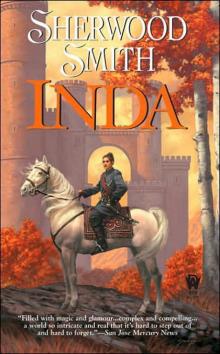 Inda
Inda Danse De La Folie
Danse De La Folie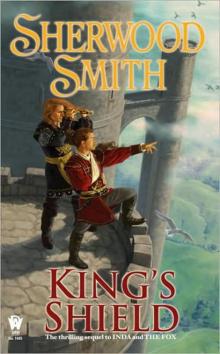 King's Shield
King's Shield Whispered Magics
Whispered Magics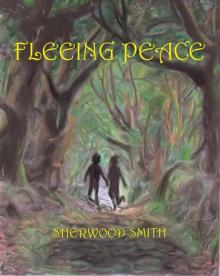 Fleeing Peace
Fleeing Peace Barefoot Pirate
Barefoot Pirate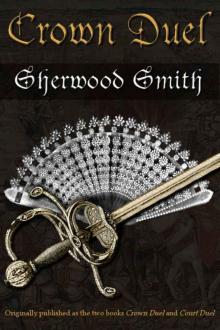 Crown Duel
Crown Duel Mearsies Heili Bounces Back
Mearsies Heili Bounces Back Commando Bats
Commando Bats A Stranger to Command
A Stranger to Command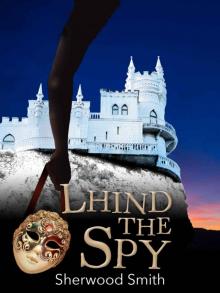 Lhind the Spy
Lhind the Spy The Spy Princess
The Spy Princess Blood Spirits
Blood Spirits Sasharia en Garde
Sasharia en Garde Lhind the Thief
Lhind the Thief Paradise Drift
Paradise Drift Banner of the Damned
Banner of the Damned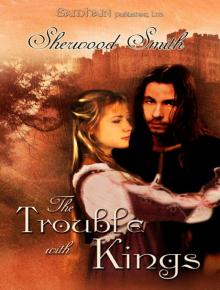 The Trouble With Kings
The Trouble With Kings Poor World
Poor World Treason's Shore
Treason's Shore Wren Journeymage
Wren Journeymage A Posse of Princesses
A Posse of Princesses Revenant Eve
Revenant Eve Once a Princess
Once a Princess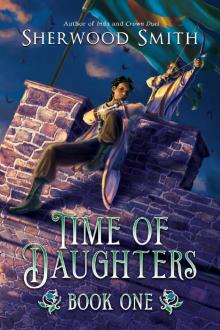 Time of Daughters I
Time of Daughters I Rondo Allegro
Rondo Allegro Coronets and Steel
Coronets and Steel Over the Sea
Over the Sea Senrid
Senrid Hunt Across Worlds
Hunt Across Worlds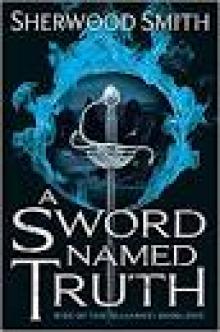 A Sword Named Truth
A Sword Named Truth The Fox
The Fox Twice a Prince
Twice a Prince Fair Winds and Homeward Sail: Sophy Croft's Story
Fair Winds and Homeward Sail: Sophy Croft's Story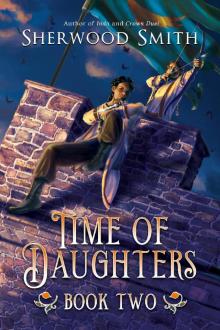 Time of Daughters II
Time of Daughters II The Rifter's Covenant
The Rifter's Covenant The Phoenix in Flight
The Phoenix in Flight Stranger
Stranger The Thrones of Kronos
The Thrones of Kronos A Prison Unsought
A Prison Unsought Twice a Prince: Sasharia En Garde Book 2
Twice a Prince: Sasharia En Garde Book 2